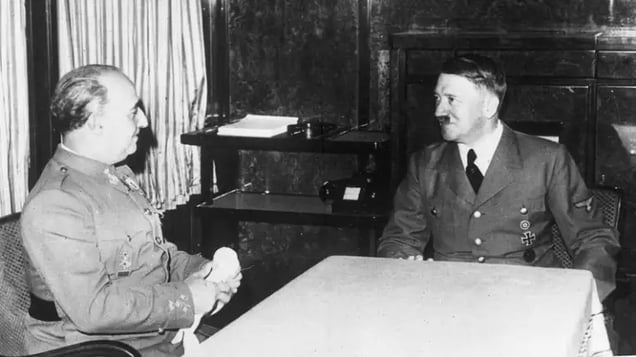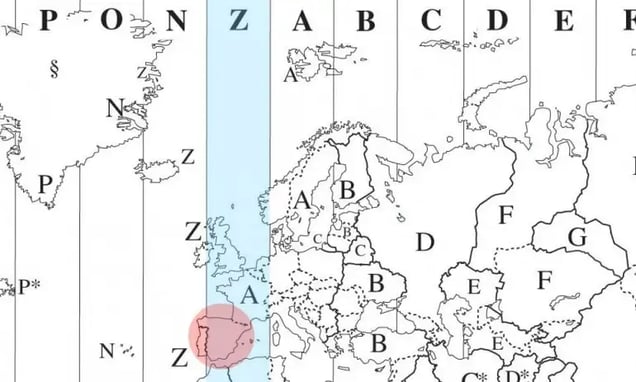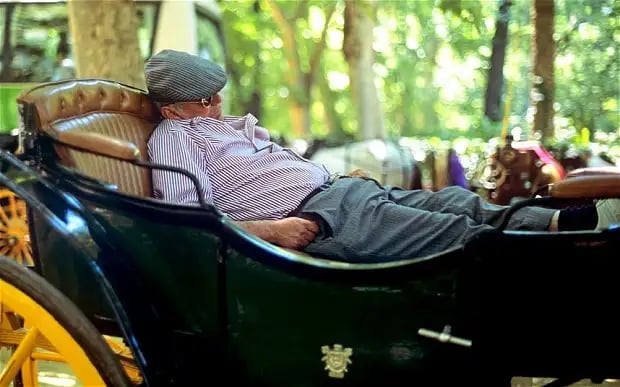On October 23, 1940, Adolf Hitler took a train to the Spanish border to meet with the country’s dictator, Francisco Franco.

The world was at war. And having recently gained an ally in Italy’s Benito Mussolini, Hitler sought Spain’s support, as well. But Spain was still recovering from its own Civil War that had only recently ended, and thus had very little to offer. So, Franco remained neutral.
However, as a sign of solidarity, he moved Spain’s clocks ahead an hour so that they were aligned with Nazi Germany.

Hitler meeting with Franco during WWII to discuss a possible alliance.
Over 70 years later, that is where they remain, leaving Spaniards stuck in the “wrong” time zone.

Spain (red) sits firmly in the Western European time zone (blue), yet runs on Central European time.
Geographically, the country is in line with Britain and Portugal, but its clocks match those of countries as far east as Poland and Hungary.
And it affects more than you might realize.
The Spanish work day
Imagine this:
Your boss pulls you into her office and gives you permission to come into work an hour late the next day. So, you head home that night and decide to take full advantage. First, you make yourself an epic feast, eating at a leisurely pace to ensure that you savor every last bite. Then, you watch THREE (one more than usual!) episodes of Gilmore Girls and get into bed at midnight as opposed to 11 p.m.
The next morning, you’re woken up by a phone call. It’s your boss telling you that she was just kidding, and that you need to come in at the normal time.
Now, imagine this happens every single day. That’s Spain.
See, since the sun sets an hour later than in neighboring countries, Spaniards go to sleep later. But they wake up at the same time. Therefore, their work days are exceedingly long and weirdly disjointed. Pretty much worst-case scenario. Nuria Chinchilla, a professor at the IESE Business School, explains:
“In Spain we eat at 2 p.m., and we don’t have dinner until 9 p.m., but according to the position of the sun, we eat at the same time as the rest of Europe: 1 p.m. and 8 p.m.”
“If we eat at 2 p.m., and dine at 9 p.m., then logically we ought to start work at 10 a.m. But we don’t do that, we start earlier, so our mornings are far too long. That’s why people need a coffee break, because they can’t wait that long to eat. So we lose time in the morning and have to work even longer in the evening.”
It’s almost as if Spaniards are living with 70+ years of jet lag, which explains the midday “siesta” that has become synonymous with Spanish culture.

“Thanks, Hitler…”
Though most workers no longer take a nap after lunch, it remains a ritual to gather with friends and colleagues for an extended lunch break.
This provides much needed relaxation for workers, but also forces them to stay at work until much later at night.
As opposed to working from 9 a.m. – 6 p.m., it’s more like 9 a.m. – 12 p.m., break, 2 p.m. – 8 p.m.
Late nights
Since workers get home as late as 9 p.m., and because the sun sets an hour later than in neighboring countries, Spain is known for its crazy nightlife hours.
But the time zone situation also affects television schedules, sporting events, and sleep.
“In England, the largest TV audience is at 7 or 8 p.m., but in Spain, it’s 10 p.m… because at 8 p.m. in Spain, barely 50% of the population is at home.” says Ignacio Buqueras, president of the Association for the Rationalisation of Spanish Working Hours. “Some football matches don’t kick off until 11 p.m.!”
As a result of the entire country operating on such a late schedule, Spaniards go to bed far later than they should. Which would be fine if they slept in, but as I mentioned earlier, they don’t.
In fact, studies suggest that Spaniards sleep an hour less than the rest of Europe, which has all kinds of negative consequences, most notably lack of productivity and increased stress.
Time for a change?
There are those in Spain who support “correcting” the country’s time zone, which will lead to a shorter work day and a healthier, more productive workforce. However, there are just as many that are opposed, citing the deep-rooted culture that is tied to Spain’s long days.
All I know is that I’m never complaining about Daylight Saving Time – which begins at 2 a.m. this Sunday – ever again.
